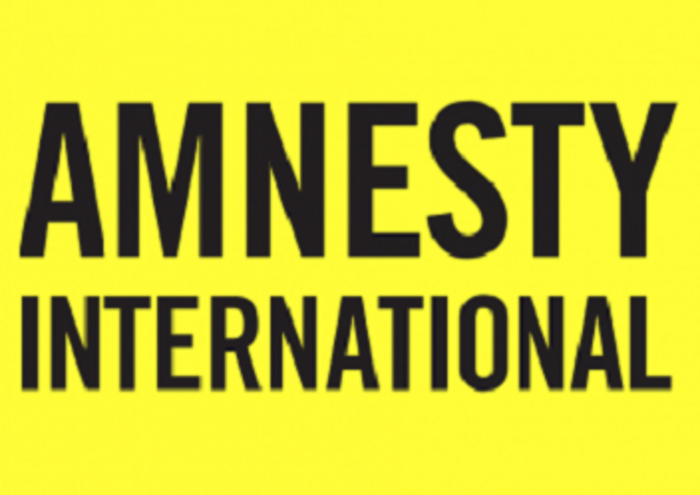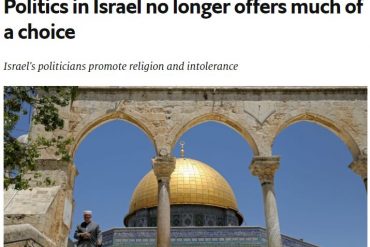A Guardian editorial (“The Guardian view on Amnesty’s Israel report: dominating the discourse”, Feb 6) opens with a characteristically Guardian framing of the Israeli-Palestinian conflict, as one which Israel, and only Israel, is responsible for perpetuating. After citing selective quotes by former Israeli prime minister Ehud Barak, former US Secretary of State John Kerry and then Foreign Secretary Boris Johnson to bolster Amnesty’s ‘apartheid’ smear, they write that it was long known that if Israel were to “carry on without making peace with the Palestinians” the country would “face credible accusations of apartheid”.
In addition to the fact that, as CAMERA has demonstrated, there is nothing even remotely “credible” about Amnesty’s apartheid accusation, the Guardian editorial, like the report itself, doesn’t even allude to Palestinian responsibility for the occupation of disputed territory and the broader absence of peace, or the painful territorial concessions Jerusalem has made over the years to achieve a peaceful solution.
Unmentioned in this and nearly every other Guardian editorial on the topic are Palestinian leaders’ decisions to reject multiple peace offers and to continue nurturing a culture of violence and antisemitism – decisions that are inimical to peace. Of course, the key word here is “decisions”, a term conveying an idea that’s anathema to the anti-Israel crowd: that Palestinians, like all adults, possess agency and are not merely passive victims of the decisions made by others.
The Guardian then writes that “such a grave diagnosis of Israel’s situation should be a concern for all those, like this newspaper, who wish for the country to prosper“, a shameful deceit given that the media group that has, arguably more than any single mainstream English language news outlet in the world, delegitmised Israel while legitmising and, at times, peddling, racist tropes about Jews.
Let’s also remember that the Amnesty report is not a guidebook for how Israel can “prosper”, but its opposite: characterising as racist, and the embodiment of ‘apartheid’, those very attributes that define Jewish statehood (like allowing for the immigration of persecuted Jews around the world), while endorsing that (such as the ‘right’ of millions of descendants of Palestinian refugees to become citizens o Israel) which would negate its existence.
The Guardian writes that “Amnesty was attacked by the Israeli government”, yet fails to acknowledge that the group’s ‘apartheid’ libel was also condemned by representative bodies of world Jewry and by leading liberal democracies, inducing the US, UK, Germany, Austria, the Czech Republic and Australia. The editorial further alleges that “there has been an emerging consensus that the term “apartheid” can be applied to Israel in a way distinct from the system seen in the old South Africa”. Yet, outside of the radical, agenda-driven NGOs their editors uncritically amplify, there is no such consensus, as ‘apartheid’ is a legal term, one that, for instance, has been defined as follows:

Another example of how the editorial amplifies Amnesty rhetoric is when they later write that Israel “command[s]…the land from the Jordan river to the Mediterranean sea”, creating the fiction that Israel, and not Hamas, rules Gaza. Then, the editorial adds, “Palestinians – including those who are Israeli citizens – are, Amnesty says, treated as an inferior non-Jewish racial group and prevented from exercising “fundamental human rights” to varying degrees depending on where they live”.
What’s notable is that the hyperlink they included in “degrees” – to back up Amnesty’s claim that Arab citizens of Israel are victims of apartheid – takes you to the completely discredited report by the anti-Zionist NGO Adalah claiming dozens of “racist” laws in Israel. Adalah’s report uses the word “racist” so unseriously that even an Israeli public health law requiring parents to vaccinate their children is included as an example of “racist” legislation.
In the last paragraph of the editorial, readers are told that “last year, protests about the expulsion of Palestinian families from their homes in East Jerusalem snowballed into a clash between Hamas militants and the Israeli army, leaving 250 in Gaza and a dozen Israelis [sic] dead”.
In addition to the fact that, due to a Supreme Court decision, there were no “expulsions” of Palestinians in the neighborhood in question, the Guardian’s wording here demonstrates the lengths editors will go to erase bad Palestinian decisions from the moral equation. There was, of course, only one regional actor responsible for last May’s war: Hamas. The antisemitic terror group’s decision on May 10, amidst Palestinian rioting at al-Aqsa, to launch an unproved volley of rockets at Israel, in a cynical attempt to show that they were the defenders of the mosque, is what started the war.
Finally, the Guardian, without explicitly using the term as they’ve done previously, clearly evokes the antisemitic “Jewish supremacy” charge at Israel:
Israel’s leaders may view as victories the continuing de facto annexation of Palestinian land, the laws with constitutional status that enshrine non-Jewish inferiority, and the entrenchment of a system of control.
The law they’re referring to is the Jewish Nation State law, which even the left-wing Israel Democracy Institute characterised as “largely symbolic” and “educational”. It does not “enshrine non-Jewish inferiority“, as there is nothing in the law which abrogates the political or civil rights of non-Jews, or erodes Israel’s democratic values. What it does do is enshrine Israel as the world’s only Jewish nation state.
Regardless of how those ‘dominating the discourse’ – be they well-funded international NGOs or global media organisations – try to spin it, the convoluted logic employed to accuse Israel, including within pre-67 boundaries, of apartheid seems based on the proposition that one Jewish state, in the context of dozens of officially Christian and Muslim states, is one too many – an application of moral double standards when judging Jewish behavior that has defined antisemitism through the ages.






Please – the only “pre-67 boundaries” of historic Palestine are the boundaries established at the San Remo conference in 1922. In other words, western Palestine, now called Israel, extends from the Jordan River to the Mediterranean Sea and eastern Palestine, now called Jordan, extends from the Jordan River eastward to Saudi Arabia and Iraq.
I think the article was referring to the armistice lines which existed from 1949 to 1967. These were not boundaries; the Arabs insisted on this in the 1949 armistice talks. The Arabs further insisted that these armistice lines were never to be boundaries or treated as boundaries.
If Amnesty Internation regards the so-called treatment by Israel of Arabs in Judea and Samaria as “apartheid”, they should also regard the treatment of Jews there by the Palestinian Authority also as “apartheid”,